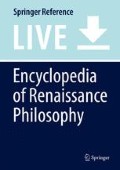Abstract
Agrippa d’Aubigné is a very prolific author: he composed both love and religious poetries, meditations, satirical tracts, political treaties, historical books, and an autobiography. He is also a man of action, who played a very important part in the Huguenot Party and a soldier who fought with energy against Catholics during the religious wars (1562–1629). He is not a philosopher nor a theologian, but all his works lie on a personal theology which draw on different authorities: the ancient philosophy, the Church Fathers, the reformed hermeneutics, and especially the Calvinist one. To understand Agrippa d’Aubigné’s thought, it is necessary to bear in mind the historical context. His religious thought is torn between two opposing feelings: a radical vision of suffering that lives the persecuted Protestants and a theology of hope which gives them the assurance of salvation. Affliction is for d’Aubigné the evidence of the election of protestant people. From the eschatologic point of view, the afflicted ones will triumph and the arrogant ones will be destroyed. This purifying conception of pain, called tribulation by Paul or “l’épreuve” by Calvin, induces d’Aubigné to justify war and martyrdom, that are the promises of celestial beatitude. The writer also took part in the political discussion about tyranny sharing the “Monarchomaques” point of view that consists of limiting the royal authority if the king exceeds his rights. D’Aubigné is especially in favor of a “monarchie mixte” under the strict control of nobility.
References
Primary Literature
Complete or selected works
D’ Aubigné, Agrippa. Œuvres complètes, publiées pour la première fois d’après les manuscrits originaux par MM. E. Réaume et F. de Caussade. Accompagnées d’une notice biographique, littéraire et bibliographique, de notes et variantes, d’une table des noms propres et d’un glossaire par A. Legouez, Paris, Alphonse Lemerre, 1873-1892, 6 vols. contenant respectivement.
tome I. Sa vie à ses enfants. Son testament. Ses lettres.
tome II. Traité sur les guerres civiles. Du debvoir mutuel des roys et des subjects. Le Caducée ou l’Ange de Paix. Méditations sur les Pseaumes. Confession catholique du sieur de Sancy. Le Divorce satyrique. Lettres diverses.
tome III. Le Printemps, Poésies diverses, Poésies religieuses et vers mesurés. Tombeaux et vers funèbres. Vers funèbres sur la mort d’Estienne Jodelle. La Création.
tome IV. Les Tragiques, Discours par stances avec l’esprit du feu roy Henri IV. Sonnets et pièces épigrammatiques. Tombeaux du style de saint Innocent. Appendice: pièces de sources diverses.
tome V. Notice biographique et littéraire. Notice bibliographique.
tome VI. Table des noms de personnes, Glossaire.
Œuvres, éd. Weber, H. J., and M. Bailbé. Soulié. Paris, Gallimard, coll. “Bibliothèque de la Pléiade”, 1969.
Other editions (selection)
Droz, E. (ed.). 1972. Le Printemps, Stances et odes. Genève: Droz.
Fanlo, J.-R. (ed.). 2003. Les Tragiques. Paris: Champion, 1995, rééd [notre édition de référence].
Fanlo, J.-R. (ed.). 2007. Ecrits politiques. Paris: Champion.
Ferrer, V. (éd.). 2004 [1629–1630]. Petites Oeuvres meslees. Paris: Champion.
Gagnebin, B. (ed.). 1948. Le Printemps, l’Hécatombe à Diane. Genève: Droz.
Garnier, A., and J. Plattard. (ed.). 1990 [1616]. Les Tragiques. Paris: Droz, S.T.F.M., 1932-1933, nouveau tirage.
Goeury, J. (éd.). 2007. Hécatombe à Diane. Presses universitaires de saint Etienne.
Histoire universelle, introduction et notes d’A. Thierry, Genève: Droz, tomes I à X, 1981-1999 [1618–1626].
Lestringant, F. (ed.). 1995. Les Tragiques. Paris: Gallimard, coll “Poésie”.
Schrenck, G. (ed.). 1986. Sa vie à ses enfants. Paris: Nizet, S.T.F.M.
Secondary Literature
Monographs
Fanlo, J.-R. 1990. Tracés, ruptures. La composition instable des Tragiques. Paris: Champion.
Fragonard, M.M. 2004 [1986]. La Pensée religieuse d’Agrippa d’Aubigné et son expression. Paris: Champion.
Lestringant, F. 2003. La Cause des Martyrs dans Les Tragiques d’Agrippa d’Aubigné, Mont-de-Marsan, Editions InterUniversitaires, 1991; nouv éd, Paris: Champion.
Lestringant, F. 2013 [PUF, 1986]. Lire Les Tragiques d’Agrippa d’Aubigné. Paris: Classiques Garnier.
Soulié, M. 1977. L’Inspiration biblique dans la poésie religieuse d’Agrippa d’Aubigné. Paris: Klincksieck.
Collections
Ferrer, V. 2003. “La Fiction prophétique dans Les Tragiques d’Agrippa d’Aubigné. Livres VI et VII”, L’Agrégation des Lettres modernes 2004, dir. Gabriel Conesa et Franck Neveu, 99–158. Paris: Armand Colin.
Pot, O. (dir). 2010. Fiction et Histoire. Actes du colloque de Genève, décembre 2002. Genève: Droz.
Journal articles
Forsyth, E. 1979. Le message prophétique d’A. d’Aubigné. BHR XLI:29–39.
Forsyth, E. 1984. D’Aubigné, Calvin et le comble des péchés, Mélanges sur la littérature de la Renaissance à la mémoire de V.-L. Saulnier, 263–272. Genève: Droz.
Soulié, M. 1986. Prophétisme et visions d’Apocalypse dans Les Tragiques d’Agrippa d’Aubigné. RHR 22:5–10.
Tournon, A. 1984. Le Cinquième sceau. Les tableaux des Fers et la perspective apocalyptique dans Les Tragiques d’Agrippa d’Aubigné, Mélanges à la mémoire de V.-L. Saulnier, 273–283. Genève: Droz.
Author information
Authors and Affiliations
Corresponding author
Editor information
Editors and Affiliations
Rights and permissions
Copyright information
© 2015 Springer International Publishing Switzerland
About this entry
Cite this entry
Ferrer, V. (2015). D’Aubigné, Théodore-Agrippa. In: Sgarbi, M. (eds) Encyclopedia of Renaissance Philosophy. Springer, Cham. https://doi.org/10.1007/978-3-319-02848-4_285-1
Download citation
DOI: https://doi.org/10.1007/978-3-319-02848-4_285-1
Received:
Accepted:
Published:
Publisher Name: Springer, Cham
Online ISBN: 978-3-319-02848-4
eBook Packages: Springer Reference Religion and PhilosophyReference Module Humanities and Social SciencesReference Module Humanities

